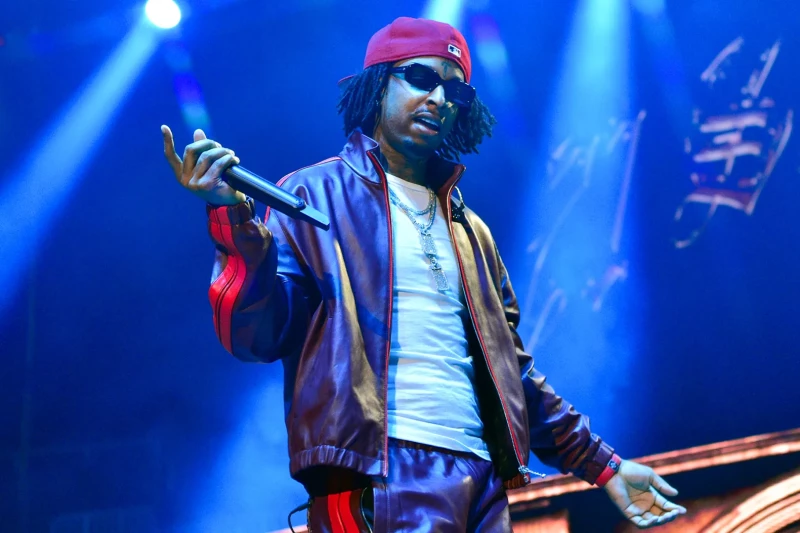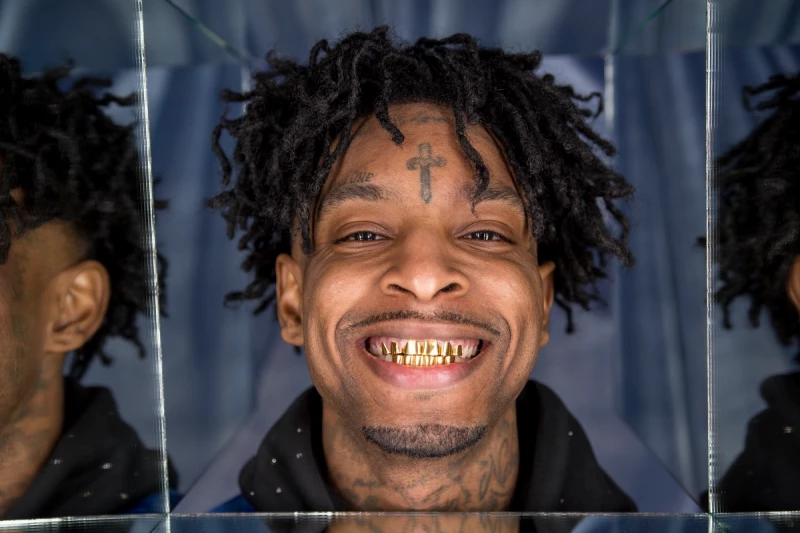British-American rapper 21 Savage has amassed an impressive $25 million fortune through his chart-topping music, smart business moves, and savvy investments, cementing his place as one of hip-hop's most financially astute artists.
How 21 Savage Got His Start in the Money Game

21 Savage, born Shéyaa Bin Abraham-Joseph back in October 1992, didn't exactly start with a silver spoon. After moving from London to Atlanta at age 7, his early life was more about survival than success. Unlike artists with industry hookups, 21's first real cash came from hustling on the streets – something he's always kept real about in his tracks.
Before all the fame and fortune, 21 was just trying to make ends meet. His first legit paycheck came from stocking shelves at a local Atlanta grocery store, earning minimum wage that barely covered bills. This struggle period left a deep mark on his music, with money problems becoming a recurring theme in his lyrics. In interviews, he's mentioned making just $7.25 an hour back then – definitely enough motivation to chase something better.
The switch from street life to studio life wasn't some overnight success story. After surviving a shooting on his 21st birthday in 2013 (he took six bullets and lived to tell about it), he decided to go all-in on music as his ticket out. This life-changing moment not only gave him his stage name but kickstarted the wealth-building journey we're still watching today.
21 Savage Coming Up: The Early Money Years
21 really started making noise around 2015 when he dropped his first mixtape "The Slaughter Tape." While this didn't exactly make him rich, it definitely put him on Atlanta's hip-hop radar. During this time, he was probably pulling in modest money from local shows – maybe a few grand here and there performing at smaller spots around the city.
The real money breakthrough came with his 2016 collab with Metro Boomin on "Savage Mode." When tracks like "X" with Future and "No Heart" blew up, mainstream audiences started paying attention. Industry insiders figure he was probably making somewhere between $100-200K annually during this period – a huge step up from minimum wage but still nothing like what was coming.
When "Issa Album" dropped in 2017 as his major label debut, things really started changing financially. The album hit #2 on Billboard, and suddenly his show fees and royalty checks were looking a lot healthier. Around this time, 21 was likely commanding $30-50K per performance, with yearly earnings potentially hitting the $1-2 million mark – pretty incredible considering where he started just a few years earlier.

When 21 Savage Hit the Financial Big Leagues
21's bank account situation reached new heights around 2018-2019. His second album "I Am > I Was" debuted at #1 on Billboard in December 2018, officially making him top-tier in the game. This era brought bigger tours, fatter streaming checks, and lucrative brand deals that seriously padded his net worth.
Live shows became a major cash cow during this peak period. He was reportedly pulling in $100-150K for a single concert appearance. His 2019 North American tour following "I Am > I Was" likely generated several million in revenue alone. On top of that, streaming money from hits like "a lot" featuring J. Cole (which snagged him a Grammy) kept the cash flowing steadily.
Another smart move in 21's playbook was locking down brand partnerships. He secured deals with heavy hitters like Spotify, Nike, and Fashion Nova, adding several more income streams to his portfolio. These endorsements typically brought in hundreds of thousands, maybe even millions annually. Unlike artists who rely just on music money, 21 was building a diversified business approach that would protect his wealth long-term.
21 Savage Today: Breaking Down the $25M Empire
As of 2025, 21 Savage is sitting on a cool $25 million net worth according to financial publications and industry experts. This figure represents the payoff from years of smart moves and strategic thinking.
His money situation today is spread across multiple channels. Music is still the foundation, with streaming royalties from his catalog bringing in consistent passive income. With billions of streams across Spotify, Apple Music, and YouTube, he's looking at multi-million dollar annual revenue without even dropping new tracks. For perspective, "Bank Account" alone has over 400 million Spotify plays – and each million streams typically generates $3-5K in royalties.
Live shows remain a goldmine, with 21 now able to demand $200K+ for festival slots and major venues. His 2023-2024 tour schedule probably added another $5-7 million to his stash. Plus, his Slaughter Gang label has started signing new artists, creating yet another revenue stream as he cashes in on their success too.
Beyond the music hustle, 21 has put money into real estate, tech startups, and other business ventures. While he keeps the details of his investment portfolio pretty private, these moves contribute significantly to his overall wealth picture. He's also dropped merchandise lines and partnership deals that keep the money flowing even when he's not in the studio or on stage.
How 21 Savage Pays It Forward Through Money Education

Despite stacking serious paper, 21 hasn't forgotten where he came from. In 2018, he launched his "Bank Account" financial literacy program (cleverly named after his hit), aimed at teaching money skills to kids who grew up like him.
The initiative has helped thousands of teens learn about saving, investing, and managing cash. Through his foundation, he's reportedly put over $100K into this cause, showing he genuinely believes in economic education as a pathway out of poverty.
During COVID, 21 showed his generous side by donating $25K to the Southern Poverty Law Center – the same organization that had his back during his immigration battle with ICE in 2019. He's also funded back-to-school drives in Atlanta, hooking up students from struggling neighborhoods with supplies they need.
These charitable moves reveal an important part of 21's money philosophy – the belief that when you make it big, you owe it to others to help them level up too. While building his own fortune, he's simultaneously creating ways for others to understand the financial game better.
21 Savage's Blueprint for Getting Money Right
Through various interviews and public appearances, 21 has dropped some serious knowledge about his approach to wealth. These insights offer valuable lessons whether you're trying to make it in music or just get your finances straight.
First up, he's big on ownership and control. "Own your masters, own your publishing – that's real wealth," he said in a 2022 interview. This focus on keeping the rights to his creative work has allowed him to maximize long-term earnings instead of taking bigger upfront checks with strings attached.
Diversification is another key move in 21's financial playbook. Rather than putting all his eggs in the music basket, he's constantly looking for new money opportunities. "Don't put all your money in one place," he advised during a financial literacy event. "Music might be hot today, but you need other things working for you tomorrow."
Most importantly, 21 goes hard for financial education. Having experienced poverty firsthand, he knows how valuable money knowledge really is. "I didn't know nothing about bank accounts until I was like 23," he once admitted, explaining why he's so passionate about teaching younger generations about money basics.
Discipline and patience are also major themes in his advice. Despite his millions, 21 is known for being relatively conservative with spending compared to other rappers. "Just because you got it doesn't mean you need to blow it," he shared during an interview about financial responsibility. This measured approach has helped him build and maintain wealth rather than becoming another sad story of fame and fortune lost.
By mixing musical talent with business smarts and financial discipline, 21 Savage has transformed from minimum-wage worker to multi-millionaire in less than a decade – a remarkable come-up story that continues to evolve as his career and investments mature.
 Usman Salis
Usman Salis

 Usman Salis
Usman Salis


